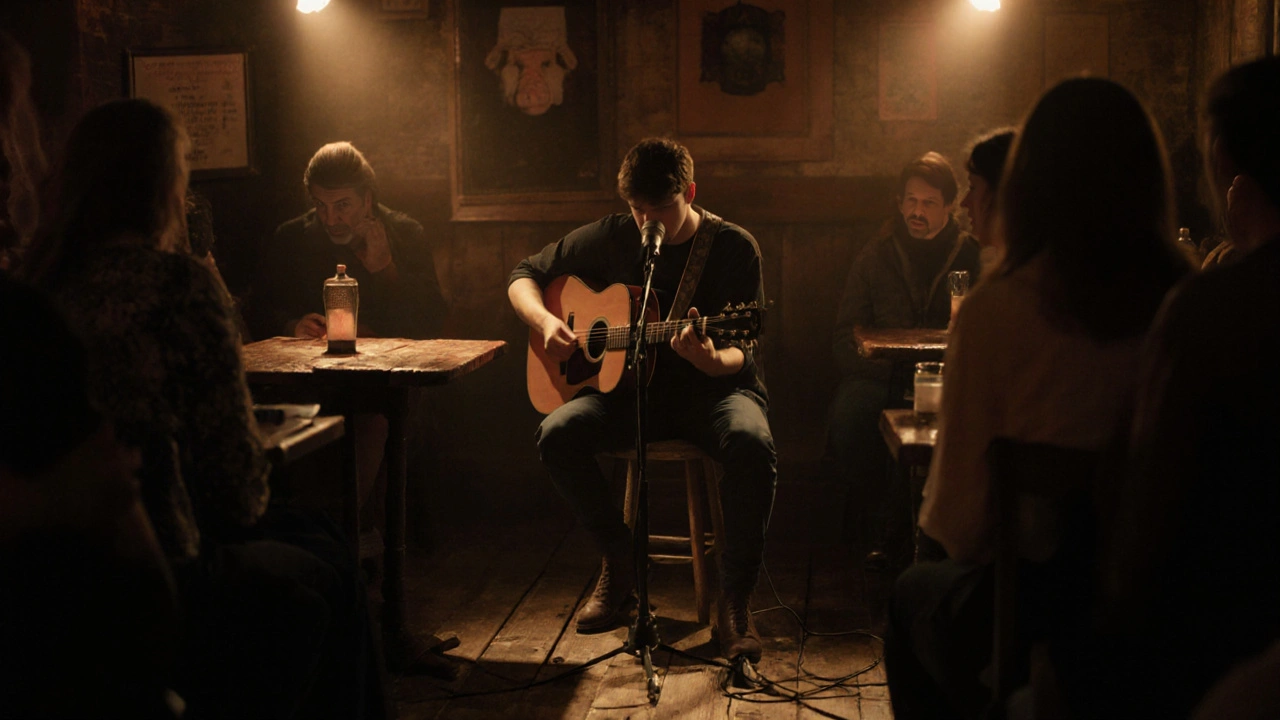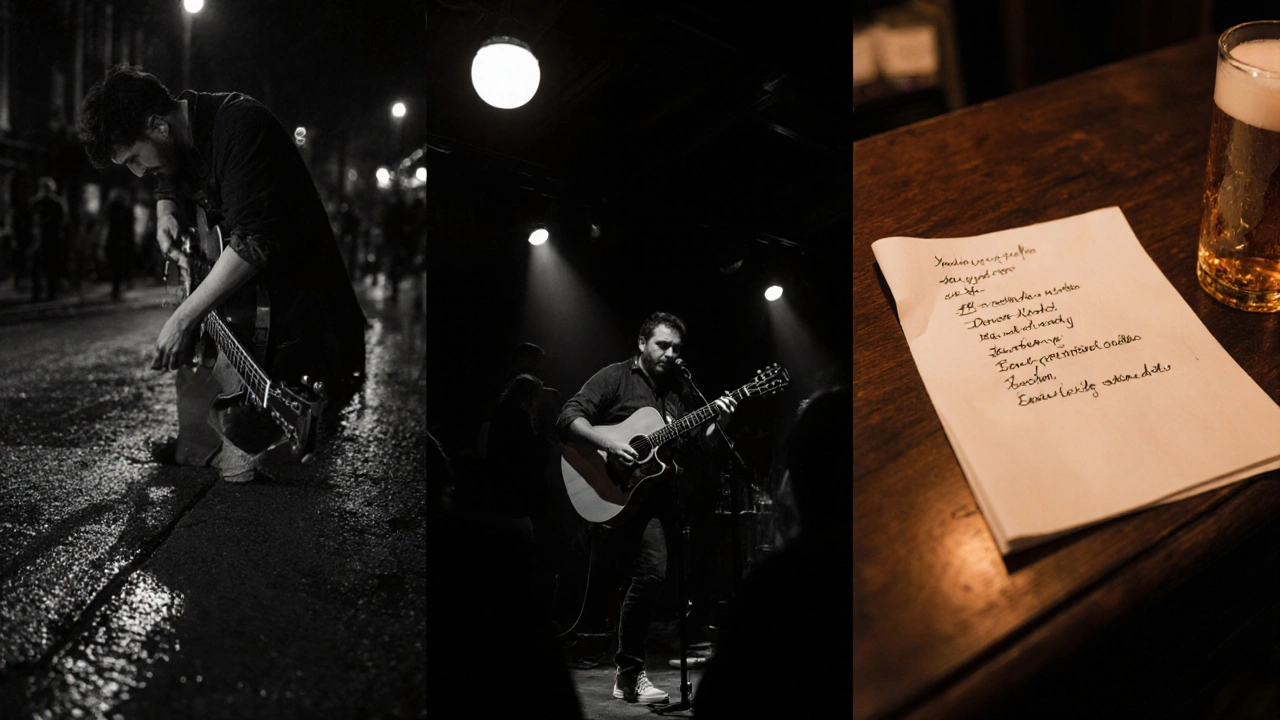
London doesn’t sleep when it comes to music. Even on a Tuesday night in November, you can walk into a basement bar in Dalston and hear someone strumming a song about lost trains and missed calls-raw, real, and completely unfiltered. Open mic nights are the heartbeat of London’s singer-songwriter scene. They’re not just gigs. They’re where careers start, where voices find their shape, and where strangers become fans over a pint of bitter.
What Makes a Great Open Mic for Singer-Songwriters?
Not every open mic is built the same. Some are crowded karaoke nights with backing tracks and crowd chants. Others are quiet, listening rooms where a single guitar can fill the space. For singer-songwriters, the best venues offer three things: a respectful audience, a decent PA system, and room to breathe.
At The Spotted Pig in Camden, the host doesn’t introduce acts with hype. He just says, “Next up, Ellie from Brighton,” and steps back. The crowd quiets. You hear a fingerpick on a Martin D-28, then a voice that cracks just enough to feel true. That’s the magic. No smoke machines. No LED screens. Just a mic, a stool, and someone telling their truth.
Look for places that limit sets to 10-15 minutes. That’s enough to play three or four songs without wearing out the room. Avoid venues that charge performers-legit open mics are free to join. If they ask for £5 to sign up, walk out. That’s not an open mic. That’s a pay-to-play trap.
Top 5 Open Mic Nights for Singer-Songwriters in London
Here are the five nights that actually matter to anyone who writes songs and plays them live.
- The Spotted Pig, Camden - Every Tuesday at 8 PM. No sign-up sheet. First come, first served. The owner, Dave, keeps the volume low and the lights dim. He’s seen over 2,000 performers since 2018. Three of them now tour Europe. You don’t get famous here. You get heard.
- The Three Crows, Hackney - Wednesday nights. Acoustic-only policy. No backing tracks. No drums. Just voice and instrument. The crowd is mostly locals-teachers, librarians, baristas-who come to listen, not scroll. The host, Maria, writes down names of standout performers and emails them later. It’s low-key, but it works.
- The Basement, Soho - Thursday nights. This one’s a bit more polished. They let you plug in, but only if you’re playing original material. They’ve hosted early gigs from artists who later signed with Bella Union and Transgressive Records. The sound engineer knows how to balance a voice without over-processing. You leave sounding like yourself, not a demo.
- The Arch, Peckham - Friday nights. A converted church with wooden pews and stained glass. The acoustics are unreal. You don’t need a mic for the quiet stuff. The audience leans in. It’s the kind of place where a song about your dad’s funeral can bring tears-and silence-for three full minutes.
- The Bedford, Balham - Sunday nights. The oldest running open mic in South London, since 1997. It’s not fancy. The stage is a few steps up from the bar. But it’s honest. You’ll hear folk, blues, jazz-poetry, and country. No genre police here. Just people showing up with their songs.
What to Bring (And What to Leave at Home)
You don’t need a fancy guitar. A well-tuned acoustic, even if it’s secondhand, will do. Bring one spare set of strings. You’d be surprised how many people show up with a broken G string and no backup.
Bring a small notebook. Write down who you met. Who gave you a nod after your set? Who stayed to chat? Those are the people who will come back next week. Or who will invite you to play their gig.
Leave the headphones at home. If you’re using backing tracks, you’re not a singer-songwriter-you’re a solo artist with a playlist. Open mics are for live performance. If you need a loop pedal, fine. But keep it simple. One loop, one voice. That’s the rule at most of the good ones.
And don’t play your “best” song first. Save the emotional one for last. Let the room settle into you. Start with something light, something rhythmic. Build the mood. People remember how you made them feel at the end.

How to Get Noticed-Without Begging for Attention
There’s no secret formula. But there are habits that separate the ones who keep coming back from the ones who disappear after three tries.
Be there every week. Not because you’re trying to impress the host. But because you’re trying to become part of the community. The best gigs aren’t booked by agents. They’re booked by word of mouth. Someone hears you on a Tuesday, tells a friend, and next month you’re on a bill with a local band that just got signed.
Don’t rush. If you’re nervous, it’s okay. The room knows. Most of them have been there. Don’t apologize for your voice. Don’t say, “I’m not good.” Say, “This is a song I wrote last week.” That’s enough.
And if you get booed? It happens. Once, a guy in Peckham played a cover of “Hallelujah” with a terrible key change. The room went quiet. Then someone shouted, “Write your own!” He did. Two months later, he was back with a song called “The Night I Sang Hallelujah Wrong.” They cheered. That’s the London way.
What Happens After the Open Mic?
Most people think open mics are just practice. They’re not. They’re auditions-for the next stage, the next gig, the next person who might change your path.
After your set, stick around. Talk to the sound guy. He knows who’s booking. Talk to the bartender. She knows who’s playing next month. Talk to the person sitting two tables over who clapped the loudest. They might be a producer, a label assistant, or just someone who believes in your voice.
Some venues keep a mailing list. The Bedford, The Three Crows, and The Basement all email performers about upcoming showcases. You don’t have to ask. Just give your name and email when you sign up. And if you don’t get a reply? Don’t take it personally. It’s not about you. It’s about timing.
There’s a reason why artists like Laura Marling, James Blake, and Ed Sheeran all played open mics in London. Not because they were perfect. But because they showed up. Again. And again. And again.

When to Try Something New
If you’ve played the same five venues for six months and no one’s asked you to play a longer set, it’s time to look elsewhere. London has over 80 open mics. You don’t have to stay stuck.
Try a Sunday night at The Jazz Café’s “Songwriters’ Circle.” It’s not loud. It’s not crowded. But the audience includes A&R reps from independent labels. Or head to the monthly “Unplugged” night at The George Tavern in Stepney. It’s been running since 1978. Bob Dylan played there in 1984. You won’t be the next Dylan. But you might be the next person they remember.
Don’t chase fame. Chase connection. The right crowd will find you if you keep playing your truth.
Final Tip: Show Up Even When You Don’t Feel Like It
There will be nights when you’re tired. When your fingers are sore. When you wrote a song you hate. When it’s raining and the Tube’s broken. Show up anyway.
Because on one of those nights, someone will be sitting in the back. They’ve been through a divorce. They lost their job. They haven’t smiled in weeks. And then you sing. And they lean forward. And for three minutes, they feel less alone.
That’s why you do this.
Are open mic nights in London free to join?
Yes, legitimate open mic nights in London are free to sign up and perform. If a venue asks you to pay to play, it’s not an open mic-it’s a pay-to-play scheme. Stick to places that let you sign up at the door with no fee. The Spotted Pig, The Three Crows, and The Bedford are all free to join.
Can I use backing tracks at London open mics?
Most singer-songwriter-focused open mics discourage backing tracks. The point is to perform live. If you use a loop pedal to layer vocals or guitar, that’s fine-it’s still you playing in real time. But pre-recorded tracks, especially full band backing, are frowned upon. Venues like The Three Crows and The Arch enforce an acoustic-only rule. Save the backing tracks for your own gigs.
What time do open mic nights in London usually start?
Most open mics start between 7:30 PM and 8:30 PM. Doors open around 7 PM, and sign-ups usually begin then. Arrive early if you want a spot-many venues limit performers to 10-15 people per night. The Bedford in Balham starts at 8 PM sharp, while The Basement in Soho begins at 8:30 PM with a 10-minute grace period for latecomers.
How long should my set be at an open mic?
Most open mics allow 10 to 15 minutes per performer. That’s usually three or four original songs. Don’t try to cram in six songs-it overwhelms the room. Focus on quality over quantity. A well-paced set of three songs with space between them leaves a stronger impression than five rushed ones.
Do I need to bring my own microphone or gear?
No. Most venues provide a basic PA system, a mic, and a stool. You should bring your own instrument, a spare set of strings, and a tuner. If you use a loop pedal or effects unit, bring your own power supply. But don’t lug in amps or drums unless you’ve confirmed the venue can handle it. Keep it simple.
London’s open mic scene isn’t about fame. It’s about finding your voice in a city of millions-and letting someone else hear it. Show up. Play true. Keep going.